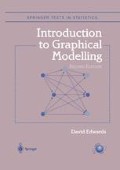Abstract
This chapter introduces some of the theory behind graphical modelling. The basic concepts of independence and conditional independence are reviewed, and an explanation of how conditional independence structures can be represented graphically is given. A brief discussion of Simpson’s paradox is given to further motivate the graphical modelling approach. The final section gives an overview of the book.
Access this chapter
Tax calculation will be finalised at checkout
Purchases are for personal use only
Preview
Unable to display preview. Download preview PDF.
Author information
Authors and Affiliations
Rights and permissions
Copyright information
© 2000 Springer Science+Business Media New York
About this chapter
Cite this chapter
Edwards, D. (2000). Preliminaries. In: Introduction to Graphical Modelling. Springer Texts in Statistics. Springer, New York, NY. https://doi.org/10.1007/978-1-4612-0493-0_1
Download citation
DOI: https://doi.org/10.1007/978-1-4612-0493-0_1
Publisher Name: Springer, New York, NY
Print ISBN: 978-1-4612-6787-4
Online ISBN: 978-1-4612-0493-0
eBook Packages: Springer Book Archive

